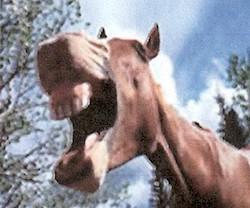 May 7, 2019 - This little phrase is considered a “proverb.” Proverbs are short and expressive sayings, in common use, which are recognized as conveying some accepted truth or useful advice. However, it does present us with a few obvious questions i.e., what is a gift-horse? Why shouldn’t you look in its mouth? What does this proverb actually mean, and how is it used? When was the last time that someone gifted you with a horse?
May 7, 2019 - This little phrase is considered a “proverb.” Proverbs are short and expressive sayings, in common use, which are recognized as conveying some accepted truth or useful advice. However, it does present us with a few obvious questions i.e., what is a gift-horse? Why shouldn’t you look in its mouth? What does this proverb actually mean, and how is it used? When was the last time that someone gifted you with a horse?
This proverb is as pertinent today as it ever was. The advice given in this “don’t look” proverb is this – when receiving a gift one should be grateful for what it is. Don’t imply that you wished for more by assessing its value. In other words, don’t be ungrateful.
As with most proverbs the origin is ancient and unknown. We do have some clues to this one however. This phrase appears in print in English in 1546 as, “don’t look a given horse in the mouth” by John Heywood.
As horses develop and age, they grow more teeth, and their existing teeth begin to change shape and project further forward. Thus, determining a house’s age from its teeth is a specialist task, but can be done. A horse’s teeth are regarded as a good guide to its age. When you buy a horse you might check its teeth to see if they match the age of the horse according to the seller.
It is possible that John Heywood obtained the phrase from a Latin text of St. Jerome, circa AD400, which contains the text “Noli eui dentes inspcere donati’ which translated means, “Never inspect the teeth of a given horse”.
Where St. Jerome got the phrase from we aren’t ever likely to know.
So, the next time someone gives you a horse don’t be ungrateful. It is considered bad manners to check its teeth, because you are pointedly drawing attention to your doubts about the quality of the gift.









